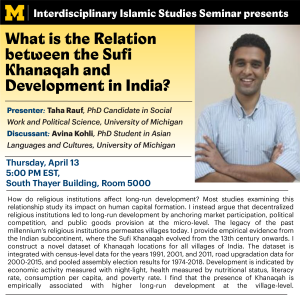Presented By: Global Islamic Studies Center
Interdisciplinary Islamic Studies Seminar. What is the Relation between the Sufi Khanaqah and Development in India?
Taha Rauf, PhD Candidate in Social Work and Political Science, University of Michigan

How do religious institutions affect long-run development? Most studies examining this relationship study its impact on human capital formation. I instead argue that decentralized religious institutions led to long-run development by anchoring market participation, political competition, and public goods provision at the micro-level. The legacy of the past millennium’s religious institutions permeates villages today. I provide empirical evidence from the Indian subcontinent, where the Sufi Khanaqah evolved from the 13th century onwards. I construct a novel dataset of Khanaqah locations for all villages of India. The dataset is integrated with census-level data for the years 1991, 2001, and 2011, road upgradation data for 2000-2015, and pooled assembly election results for 1974-2018. Development is indicated by economic activity measured with night-light, health measured by nutritional status, literacy rate, consumption per capita, and poverty rate. I find that the presence of Khanaqah is empirically associated with higher long-run development at the village-level.